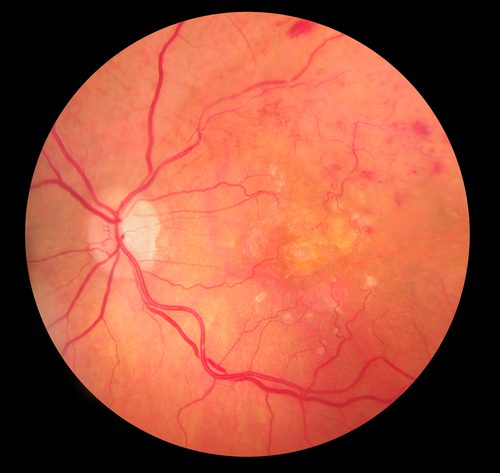What is Age related macular degeneration (ARMD)?
What are the types and stages of AMD?
There are two types of age related macular degeneration – dry and wet. Dry AMD accounts for 85% of patients with AMD and consists of slow, accumulative damage to the central vision with age. Dry AMD is categorised into 3 stages: early, intermediate and late, and unfortunately there is no proven treatment for this. Wet AMD (also called neovascualr AMD) is significantly less common and is associated with a quicker more noticeable drop in vision or onset of visual distortion. It is caused by the growth of abnormal, fragile blood vessels in the back of the eye and fortunately there are treatment options available for this. Any stage of Dry AMD can progress to wet AMD and the earlier treatment is administered the better the visual prognosis, so it is essential to seek medical assistance should sudden changes in vision be noted.
What can increase my risk of AMD?
Increasing age, caucasian ethnicity and family history can increase the risk of someone developing AMD, however there are notable lifestyle factors that can be addressed to minimise the likelihood of AMD;
- Smoking – Smoking dramatically increases the risk of developing and the progression of AMD, talk to your GP and local NHS service to get help and advice on quitting.
- Healthy lifestyle – Both cardiovascular diseases (eg. High blood pressure) and lack of exercise have been identified as possible risk factors for AMD. Therefore, it is important to attend regular appointments with the GP as required, combined with a healthy and active lifestyle.
- Sunlight exposure – although it has not been proven, some studies suggest that UV exposure over a lifetime may increase the risk of developing AMD. It is therefore recommended to wear sunglasses to protect the eyes where possible.
- Diet – Several studies suggest diet and nutrition play an essential role in the maintenance of a healthy retina (the light sensitive layer at the back of the eye). The British Journey of Ophthalmology suggested those who regularly consume unhealthy foods were three times more likely to develop late-stage AMD over the next 18 years. The benefits of nutritional supplements are described in greater detail below.
Will taking nutritional supplements reduce my risk of Macular degeneration?
Many studies have considered the above question, however the strongest evidence pertaining to this comes from the Age-Related Eye disease Study (AREDS). This robust clinical trial investigated whether taking a precisely calculated dose of carotenoids, antioxidant vitamins and zinc could slow down the progression of AMD.
Two formulations AREDS and AREDS2 were developed and studied. Concerns arose with the initial AREDS formulation as it contains beta-carotene supplements. These were found to increase the risk of lung cancer in current or previous smokers. As a result, the formula evolved to AREDS2 where beta-carotene was replaced with alternative antioxidants – lutein and zeaxanthin (Table 1).
| AREDS2 | |
| Vitamin C | 500mg |
| Vitamin E | 400IU |
| Zinc | 25mg |
| Copper | 2mg |
| Lutein | 10 mg |
| Zeaxanthin | 2mg |
| Table 1: AREDS2 Formula |
The results found that those with late stage dry AMD (those at medium to high risk of progression) who took the ‘AREDS2 formula’ used on the trial, reduced their risk of progression by 25%. There was no evidence to suggest supplements had any effect on those diagnosed with early stage AMD.
There is no comparable study of the same quality to support this evidence and therefore more research is required before it can be advised definitely. The National Institute for health and Care Excellence (NICE) provide guidance on current best medical practice. NICE have not approved the use of antioxidant vitamins and minerals in the management of AMD due to the small evidence base.
Most recommended nutritional antioxidants can be absorbed through a well-balanced and healthy diet rich in fruit and vegetables. On balance, if daily consumption of these is low or absent, evidence suggests that supplements may help if you are at high risk of developing late AMD. If you are not sure how advanced your condition is then you should ask your optometrist/ophthalmologist.
Although generally safe, if you are considering taking a supplement for AMD it is important to discuss this with your Ophthalmologist/GP as taking a larger amount of vitamins and minerals than those found in an everyday diet may not be suitable and could cause side effects.
How do improve your diet for AMD?
Carotenoids: Carotenoids are plant pigments found in green, yellow and red fruits and vegetables. Lutein and zeaxanthin are two essential carotenoids found in the macula and several studies have shown them to be protective against oxidative damage in the retina. Foods high in Lutein and Zeaxanthin include;
- Dark leafy greens (spinach/ Kale)
- Green Peas
- Brussels sprouts
- Broccoli
- Asparagus
- Carrots
- Corn
Zinc and copper: Zinc and copper also play a protective role against oxidative stress of the eye, and may help alleviate ‘wear and tear’ in the form of AMD. The richest food sources of zinc include oysters and meat (e.g., beef, veal, pork and lamb), whereas meats, nuts and seeds, chocolate and shellfish have the highest copper content.
What do I do if I think I have Macular Degeneration?
If you are concerned that you may have Macular Degeneration or would like more information do get in touch via the contact page.
References
- England Journal of Medicine, 358(24), pp.2606-2617.
- Jager, R.D., Mieler, W.F. and Miller, J.W., 2008. Age-related macular degeneration. New Mozaffarieh, M., Sacu, S. and Wedrich, A., 2003. The role of the carotenoids, lutein and zeaxanthin, in protecting against age-related macular degeneration: a review based on controversial evidence. Nutrition journal, 2(1), pp.20.
- Wu, J., et al., 2015. Intakes of lutein, zeaxanthin, and other carotenoids and age-related macular degeneration during 2 decades of prospective follow-up. JAMA ophthalmology, 133(12), pp.1415-1424.
